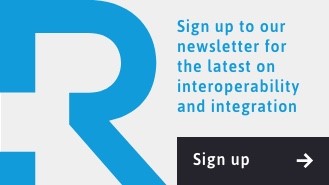Why microservices are the answer for shared care records
In our recent blog ‘How to build a shared care record in less than a year‘ we discussed the core functionality required to implement a ‘basic’ shared care record within the September 2021 deadline announced by NHSX at the beginning of autumn. There we outlined what you need, here we take a look at how you can achieve it with a development technique called microservice architecture.
The beauty of microservices is their simplicity, and that’s what’s makes them perfect for sharing records no matter how digitally advanced your organisation is.
Get in touch if you’re looking for a shared care record solution
What is a shared care record?
Let’s reconsider what a shared care record is. A shared care record is an IT application which enables a clinician to view real-time patient data at the point-of-care. It doesn’t matter who that clinician is or what care setting they are in; everyone has (role-based) access to relevant and timely information about a patient.
To take another step back, this makes a shared care record, essentially a collection of lots of different sources of information. It is those disparate sources that make microservices the only way to build fast, resilient and scalable shared care records.
What is a microservice architecture?
To understand the benefits of microservices and why this approach builds shared care records quickly, you need to compare them to monolithic architecture which is used in more traditional large scale software projects.
The monolithic architecture intends to build a shared care record as one autonomous unit with interconnected and interdependent components. If you need to make changes or updates in the monolithic architecture, for example, to add datasets, developers might have to rebuild and deploy the entire system again. Monolithic inflexibility slows down your digital maturity because you are unable to scale specific parts of the system i.e. it all must be scaled together.

Microservices almost ‘does what it says on the tin’. They are essentially a collection of small modules that are built and deployed independently. Each microservice can handle particular tasks such as managing pathology data, authenticating users or enabling communication with other microservices through APIs. This independence allows you only to change the function that needs updating, and often each service will have its own data source, which makes the whole process easy to test and deploy.
Being able to update one function at a time means that your shared care record can start with a ‘basic’ level of data sharing. You could easily connect patient demographics with pathology and radiology, and then add additional modules when it is a priority. Microservices enable you to roll out a ‘basic’ shared care record, get clinicians on board, and scale quickly.
Get in touch if you’re looking for a shared care record solution
The benefits of open technology
Microservices give developers the freedom to choose the best technology and programming language for the module required. This means that your shared care record can meet NHS Digital’s objective of using open technology.
An effective shared care record is browser-based with zero footprints on a user’s device – extracting data on demand, leaving data in the source system to speed up deployment and performance. This flexible and open microservice architecture is also device-agnostic, so your clinicians can access patient information from wherever they are working.
Most microservices also take advantage of open-source databases to breakdown storage into smaller chunks. This significantly reduces the cost and licence fees of your care record and adds a high degree of flexibility through a relational database strategy. Relational databases support interoperability by storing attributes that can easily be integrated to establish relationships among data points to present a complete view of a patient from different sources.
Futureproofing shared care records
Unlike monolithic care records, you can develop microservices in different programming languages. Because microservices are modular and independent, they can be added to, updated or even replaced without negatively affecting other services. For example, your trust could replace a maternity system in future without worrying about the impact on the shared care record, because each service is managed independently.
Monolith systems rely on a fixed technology stack, so you cannot easily change things such as the platform or framework of your shared care record. If suppliers stop providing support, or technology becomes obsolete, your entire system will need an overhaul and could put patient safety at risk. Microservices can be added to the shared care record with minimal disruption and services can be scaled as and when required, providing a high-level of futureproofing.
There’s a better way to share care records
Microservices work brilliantly for large organisations that run millions of processes every day like the NHS. The approach is also very well suited for developing reusable components like a module for alerts, documents or GP Connect. Microservices solve the root cause of the NHS’s lack of access to data without trying to replace or control existing systems.
ReStart’s shared care record solution, the IMX Clinical Record is built using microservices. It is the best way to connect lots of different dots between hundreds of backend systems and display the relevant information a clinician needs for care of their patient.
We understand the NHS, we know all major clinical systems, and we’ve deployed over 1500+ health & care interfaces. Customers can choose from existing reusable components, or we can develop new ones based on their needs, with any new module added to the IMX portfolio for the benefit of all our NHS clients.
Get in touch
To discover how your organisation could benefit from a shared care record build using the IMX Clinical Record get in touch or email hello@restartconsulting.com


